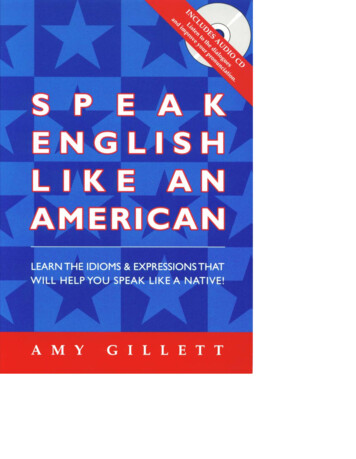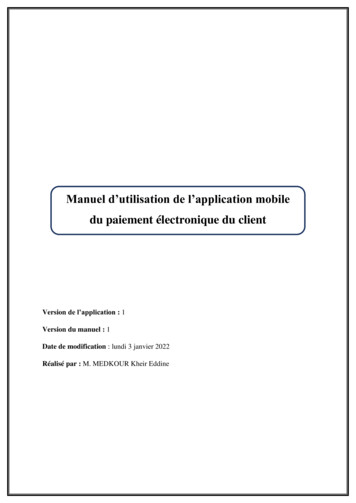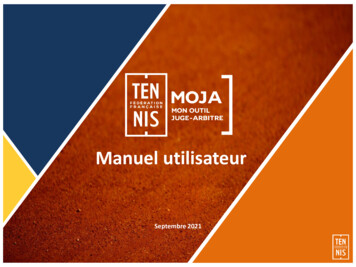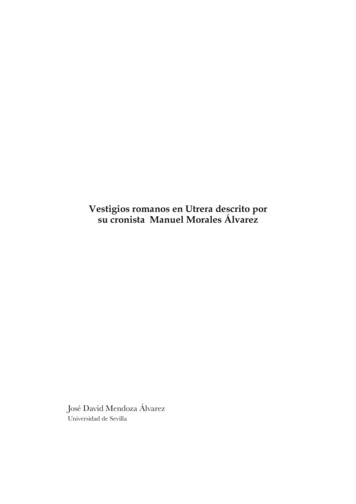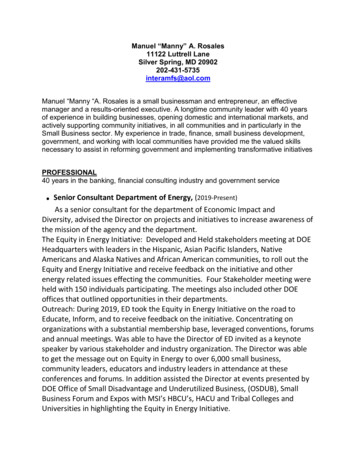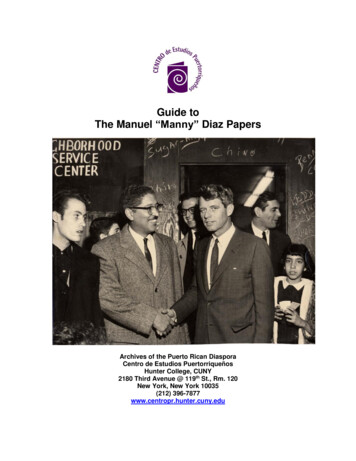
Transcription
Guide toThe Manuel “Manny” Diaz PapersArchives of the Puerto Rican DiasporaCentro de Estudios PuertorriqueñosHunter College, CUNY2180 Third Avenue @ 119th St., Rm. 120New York, New York 10035(212) 396-7877www.centropr.hunter.cuny.edu
Cover Photo: Manny Diaz welcoming Robert F. Kennedy at the Neighborhood Service Center, c.1970.
Descriptive SummaryCreator: Manuel “Manny” DiazTitle: The Manuel Diaz Papers, 1940-2007Inclusive Dates: 1940-2007Bulk Dates: 1960-1985Volume: 7.5 cubic feetRepository: Archives of the Puerto Rican Diaspora, Centro de Estudios PuertorriqueñosAbstract: Manny Diaz was a founding member of such community based organizations as the Puerto RicanForum, ASPIRA, the Hispanic Youth Association, the Puerto Rican Family Institute and Boricua College. He wastrained as a social worker and went on to lead numerous institutions and initiatives, among them the Puerto RicanCommunity Development Project, Mobilization for Youth and PROGRESS, Inc. He received his B.S.S. from theCity University and his M.S.W. from Columbia University. He served on the faculties of Columbia University,Boricua College and Fordham University. The collection measures 7.5 cubic feet and contains photographs,event programs, audiocassettes, DVD’s and reports. It spans the years 1940-2007 and focuses on the New Yorkmetropolitan area.Administrative InformationCollection Number: 2004-004Provenance: The collection was donated by Andrea (Ande) Diaz and Lisa DiazCopyright: Centro de Estudios Puertorriqueños, Hunter College, CUNY.Restrictions: The collection is open to researchers.Preferred Citation: The Manuel Diaz Papers, 1940-2007, Archives of the Puerto Rican Diaspora. Centro deEstudios Puertorriqueños, Hunter College, CUNYProcessing Archivists: Richard Tejada and Alberto Hernandez-Banuchi with the assistance of JonathanMorales. Project Supervisor Pedro Juan Hernández.Date: July 20141
MANUEL “MANNY” DIAZ (1922 – 2006)Biographical Note:Manuel “Manny” Diaz, Jr. (1922-2006) was a Puerto Rican social worker, activist and academic. He helped foundand lead several organizations dedicated to helping Puerto Ricans and other minorities in New York City,including PROGRESS, ASPIRA and the Puerto Rican Community Development Project. Born in Puerto Rico, hewas educated at City University of New York, Columbia and Brandeis, and served on the faculties of Columbia,Fordham and Boricua College. He served on the White House Conference on Families and the New York StateAdvisory Commission for Hispanic Affairs.Manuel Diaz was born in Humacao, Puerto Rico on September 19, 1922 to Manuel Diaz Gomez and FilomenaVelazquez Rodriguez. His mother was a seamstress and his father owned a printing business. At the age of fivehe migrated to New York with his uncle Victor Velazquez, his mother having gone ahead of him and his fatherarriving a few months later. They first lived in a tenement on West 114 th Street, later moving to a three bedroomapartment in Morningside Heights. The Diaz family scraped by on minimal incomes during the Great Depression,with Manuel Sr. and uncle Victor making and selling moonshine for extra money. Diaz was also involved in politicsat an early age, handing out fliers for Congressman Vito Marcantonio at the age of ten.Diaz attended P.S. 109 on 111th Street until fourth grade. He also attended P.S. 157 and P.S. 165, as the familymoved frequently. He did not master English until the fourth grade. After attending James Fenimore CooperJunior High School, his mother wished to enroll Manny in Stuyvesant High School. He was initially rejected fromattending due to his grades, which led to his mother staging a one-woman sit-in at the principal’s office until theschool relented. He graduated from Stuyvesant in 1941, the first Puerto Rican to do so, shortly before the UnitedStates entered World War II.Following Pearl Harbor, Manny Diaz enlisted in the Army Signal Corp Reserve, completing the Army SpecializedTraining Program and completing coursework toward an electrical engineering degree. Upon completion of histraining, he was sent into active duty, and participated in the invasion of Normandy as a courier. Later in the war,he was among the regiment of Allied soldiers who discovered the first of the concentration camps used for theHolocaust.After the war’s end Diaz enrolled in City College, CUNY to complete his degree in electrical engineering degree,but tuberculosis interrupted his studies. When he returned to school he decided to change his degree tosociology, graduating in 1951. At City College he met and later married Lisa Hymowitz; their daughter Lisa Diazwas born the same year. Following his baccalaureate he entered Columbia University’s School of Social Work,earning his MSW in 1953.Diaz joined the Union Settlement Association, a social services organization in El Barrio, in 1953. He started outas a Teenage Program Supervisor, later becoming Program Director, before resigning in 1959. During his timeat Union Settlement Diaz met and worked with several others who would later become influential in the PuertoRican and Latino communities, such as Antonia Pantoja, Angelo del Toro, Josephine Nieves and a teenagedHerman Badillo who was under his supervision. Union Settlement provided retreats and camps for members ofthe community, and time for Diaz and others to brainstorm ideas for improving their communities.Following his tenure at Union Settlement, Diaz took a position with the American Society of Friends in México asa director of community development. After one year in México he returned to the U.S. and joined the BadenStreet Settlement, a community development organization in Rochester, NY. During this time he married SharonDaniel and had two daughters, Cristina (born 1961, died three months later from SIDS) and Ande (born 1962).Diaz then took a position for New York City’s Mobilization for Youth in 1962. During this time he also assistedPantoja in establishing ASPIRA, helping to raise the initial funds for the organization. He would later serve on itsboard of directors, as well as the board of the Puerto Rican Forum, the Puerto Rican Family Institute, and BoricuaCollege, among others.2
Diaz continued to work on behalf of the Puerto Rican community by founding the Puerto Rican CommunityDevelopment Project, an anti-poverty organization working with other community-based organizations. In 1966,Diaz was appointed Northeast Regional Director of the Equal Employment Opportunity Commission, whichinvestigated employment complaints and labor practices nationwide. In 1968, he was appointed by Mayor RobertLindsay to New York City’s Civilian Complaint Review Board, where he helped mediate disputes between citygovernment and various groups. Most notably, he helped ameliorate the dispute with the Young Lords Party,whose members were demanding lunch programs for Puerto Rican schoolchildren. When the Rev. Martin LutherKing was assassinated the same year, Diaz walked the streets of El Barrio at Mayor Lindsay’s request to helpprevent riots from breaking out as they had in other cities.Diaz returned to school following his appointment with the city, studying at Brandeis University’s School of SocialWelfare Planning on a fellowship from 1970-1972. During this time he married Emma Ramos. In 1972, he wasappointed to the faculty of Fordham as an associate professor of social policy. While at Fordham Diaz establisheda scholarship for minority students in the school of social work, and chaired a committee which led to theestablishment of the school’s doctoral program. He was also appointed chairman of the National Association forSocial Workers Insurance Trust. In 1979, he was selected to sit on the White House Conference of Families,created to make recommendations for the federal government on family issues.In 1981 Diaz became the executive director of the Puerto Rican Organization for Growth, Research Educationand Self Sufficiency, or PROGRESS. PROGRESS was committed to assisting the Puerto Rican community byoffering technical assistance to Puerto Rican community-based organizations, such as providing workshops toimprove fundraising capacities. In 1983 he served as chairperson for New York State’s Advisory Committee onHispanic Affairs under Governor Mario Cuomo. During his tenure as chairperson he helped makerecommendations to the Governor’s office on improving the conditions of the Hispanic community. TheCommittee clashed with critics such as Angelo Falcón, head of the Institute for Puerto Rican Policy, regardingthe efficacy of these recommendations. He retired from PROGRESS in 1987 following a heart attack. He thentook a part time job working for Congressman Angelo del Toro, and then relinquished the position in 1990following another, more severe heart attack. Following this episode Diaz fully retired from public service anddevoted himself to his family and to traveling.Manny Diaz died on March 20, 2006, at the age of 84. He is survived by his two daughters, Lisa and Ande, andmourned by the entire Latino community.3
Scope and Content:The papers of Manuel Diaz contain significant material on the life and work of the Puerto Rican social worker andcommunity organizer. His oral autobiography is preserved on a series of audio cassettes, as well as recordings of hisacademic study, travels and community work. Writings by Diaz detail his life and his outlook on the issues of his time.There is also significant material on social issues such as education and child care, with particular emphasis on PuertoRicans. The collection contains correspondence, photographs, audio and visual files, and artifacts.The collection is divided into the following series:I.II.III.IV.Biographical and Personal InformationOrganizations and CommitteesSubject FilesAudio and Visual Files4
Access Points / Términos de Acceso:Name / NombresBadillo, HermanBonilla, FrankCanino, MariaDel Toro, AngeloDiaz, ManuelFalcon, AngeloFalcon, JoeLindsay, RobertMonserrat, JosephNieves, JosephinePantoja, AntoniaThomas, PiriSubject Organizations / Nombres CorporativosASPIRABrandeis UniversityCivilian Complaint Review BoardColumbia UniversityEqual Employment Opportunity CommissionFordham UniversityHispanic Youth AssociationInstitute for Puerto Rican PolicyMobilization for YouthNational Association for Social WorkersNew York State Advisory Committee for Hispanic AffairsPuerto Rican Community Development ProjectPuerto Rican Organization for Growth, Research and Self-Sufficiency (PROGRESS)Universidad BoricuaSubject Places / Nombres GeográficosChinaHumacaoNew YorkPuerto Rico5
Series I: Personal and Biographical Information (1940-2006)This series details the life, travels and writings of Manny Diaz. Among these are two autobiographical documents, oneprepared with the assistance of Dolores Rasalas, which richly detail Diaz’s life up until his retirement. Also included isa partial transcript of an oral history he committed to audio in 2003. Also included is a portion of his dissertationsubmitted for his degree from Brandeis University and two photographs of Manny respondence, 1964-2006The Puerto Rican Society: A Beginning Framework For Research andAnalysis, by Manny Diaz, April 1974Executive Inventory Record Forms, 1966-1967Hispanic Commission to Israel, 1979-1984Obituary, El Diario/ La Prensa, 2006Oral History Transcript, 2005Personal Papers, 1940-2006Reference Letters, 1970-1987Transfer Papers, 2006-2007Writings, undated, 1962-2005Photograph of Manny Diaz at PRCDP dinnerPhotograph of Manny Diaz with social worker Magdalena MirandaOversized DocumentsIndex Card Directory, undatedSeries II: Organizations and Committees (1963-1992)Manuel Diaz’s work in the community as well as in government is documented in this series. The papers ofPROGRESS (Puerto Rican Organization for Growth, Research, Education and Self-Sufficiency) include internalmemos and meeting minutes which shed light on the organization’s workings. The papers on the state AdvisoryCommittee for Hispanic Affairs include letters to El Diario/ La Prensa criticizing the paper’s coverage of the Committee,and verbal sparring with Angelo Falcón, then-head of the Institute for Puerto Rican Policy. The managementcurriculum of the Hispanic Leadership Development Program highlights Diaz’s interest in labor matters.BoxCaja2FolderCartapacio12-34-5678New York State Governor’s Advisory Commission on Hispanic Affairs,1983-1985PROGRESS, 1979-1992Hispanic Leadership Development Program: Management CurriculumUniversidad Boricua, undated, 1963-1971White House Conference on Families, 1979-1980White House Conference on Families, Directories, c. 1979Series III: Subject FilesThis series includes files and reports on various aspects of life for Puerto Ricans in the United States, includingeducation, history and social policy. There is also material on various aspects of social policy, including child abuse.Also included is material written by or about other members of the Diaz family, including Andrea (Ande) Diaz, LisaDiaz and Emma Ramos-Diaz.6
BoxCaja3FolderCartapacio1234567841234567-9Child Abuse Articles and Information, undated, 1980-2000City College of New York-CUNY, 1971-1995Diaz Family, undated, 1984-2007 (Missing)General Subject Files, undated, 1974-2002Puerto Rican Education, undated, 1970-1976Puerto Rican Families, 1975Puerto Rican History, 1956-c.1970Cuaderno, Units #2 & 6- CENTRO Fall 76Puerto Rican Independence, 1977-1998Puerto Rican Migration, 1950-1983Puerto Ricans in Public Schools, 1968-1985Social Policy, undated, 1977-1995Studies of Puerto Ricans in the United States, undated, 1967-2001Thesis, Community in Action: The Central Harlem Experience in the Waron Poverty, 1963-1968, by Andrew Block, December 2005Writings of others, undated, 1971-1987Series IV: Audio and Visual FilesThe files in this series primarily record the life of Manuel Diaz. An extensive, twenty-seven CD set (also duplicated ontwenty-two audio cassettes) contains an oral autobiography of Diaz, in a series of interviews conducted by BlancaVazquez. In addition, the series holds over 100 additional audio cassettes documenting Diaz’s work as a facultymember at Fordham University, various lectures and travel to China. The recordings include excerpts of lectures byfigures such as Joseph Monserrat, Josephine Nieves and Piri Thomas, among 24252627-303132-33Audiocassettes Featuring Manny DiazAustin, Paper Discussion, c. 1971China Trip Planning Meeting, c. 1977For Colored Girls, c. 1980Columbia University School of Social Work—Alumni, undatedCouncil on Social Work Education—APW Workshop #96, 1976 March 2Diaz, Manny and Canino, Maria Dissent from Governor’s Committee,c.1980Diaz, Manny, Oppressive Systems and the Puerto Rican Community, 1975Dissertation/Conflict DiscussionFaculty, 1981 May 13Fordham Faculty Retreat/Job Placement, 1976 February 17Fordham Faculty Symposium, circa May 1976Fordham Faculty Futures Committee-Mayer tapes, 1980-1981Futures Committee in China, 1980 October 17Gurin, Arnold, c. 1973Job Placement Committee/Fordham Faculty Colloquium, 1976 May 18Keynote Speech to Annual Conference of Puerto Rican Social Workers,Nov. 1976Machismo Lectures and Discussions with Manny Diaz, 1975 November 71976National Association of Social Workers—Manpower, undatedPRIMESS Conference, Nov. 19767
26-12712861-2728PROGRESS, Membership, 1982 April 15PROGRESS, Personnel Committee, 1981 May 26 (recorded music onone tape-Diana Ross)PROGRESS, Executive Committee 1981 May 13—1981 September 22PROGRESS Staff Meeting, 1981 July 30PROGRESS, Staff/Board Review Meeting tapes, c. 1983 March 23PROGRESS Board of Directors tapes, 1981 June 9-1982 July 21Puerto Rican Committee, Fordham, 1976 February 3Puerto Rican Lecture #3, undatedPuerto Rican Social Workers/Morning Session, undated (Cracked/Broken)Radio WADO with Malin Falu—Manny, Nilda, Damaso, 1981 June 25Revolutionary Neighborhood Committee of Peking (Beijing), 1977Social Transformation in China with Manny Diaz Presentation, 1977Transportation Lecture, 1973 April 9World Trade Center Symposium on Puerto Ricans and Mental Health,undatedAudiocassettes, GeneralBinstock, Robert Lecture, 1973 March 28Bonilla, Frank/Migration-Centro, undated,Castro/Leca Viscaino Flemming, undatedCentro de Estudios Puertorriqueños Seminar: Josephine Nieves, 1976February 5-1976 May 6Centro de Estudios Puertorriqueños Seminar: Joe Falcon and Linguistics,c. 1976Chicago Symphony Orchestra in Hong Kong, 4/7/1986 removeConservatory, 1977 (Bad Tape)Cuban Embassy—Bucharest, 1977Dalian (Talien), China, 1977General Discussion/Inaudible, undatedGerontological Society Conference on Spanish Speaking Elderly, c. 1970Greek Cruise Ship/Diaz Orientation on Cultural Revolution at Hillside PartII, 1977Harry Rodriguez at Fordham, undated (Broken)Hausman, Leonard lectures, 1973 February 20—1973 May 18Institute of National Minorities, 1977Korean Minority Brigade at Shanghai Conservatory, 1977Kurtz, Norman Lectures, 1973 February 5—1973 May 14Monserrat, Joseph and Frederico Aquino, 1971 January 6New School China Lecture, 1977Peking (Beijing) University, 1977Puerto Rico China Group Orientation/Retreat #1-2, 1977Puerto Rican Syndrome, undatedSymposium tapes (Austin/Discussion), undatedTarrytown Family SWAPS Class Discussion, undatedThomas, Piri and Frederico Aquino, 1971 January 6Warren tapes, 1973 March 19, April 9, May 7Women in China Conference, 1977Women and Socialism, 1976 December 18Manny Diaz Oral History Project and Miscellaneous CD’sManny Diaz Oral History Project, 2003Manny Diaz/Maria Canino Dissent on Governor Cuomo’s Task Force onPoverty and Welfare c. 1980 (inside cushioned mailer)8
2930-51525354Speech by Manny Diaz, Oppressive Systems and the Puerto RicanCommunity, 1975 (inside cushion mailer)AudiocassettesManny Diaz Oral History Project, 2003Oppressive Systems and The Puerto Rican Community, Manny Diazspeech at National Association of Social Workers, 1975 (inside cushionmailer)Manny Diaz/Maria Canino Dissent on Gov. Cuomo’s Commission onPoverty and Welfare, c. 1980 (inside cushion mailer)DVD’sBlack-Latino Alliances and Allegiances—Stories of Structural Change fromManny Diaz. Fielding Graduate University—Symposium, 2006 January 119
1 Descriptive Summary Creator: Manuel "Manny" Diaz Title: The Manuel Diaz Papers, 1940-2007 Inclusive Dates: 1940-2007 Bulk Dates: 1960-1985 Volume: 7.5 cubic feet Repository: Archives of the Puerto Rican Diaspora, Centro de Estudios Puertorriqueños Abstract: Manny Diaz was a founding member of such community based organizations as the Puerto Rican



